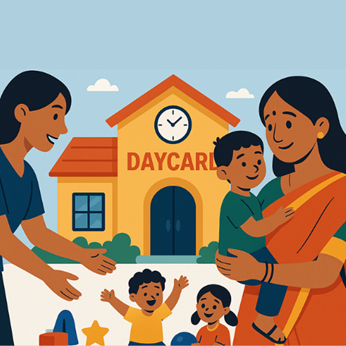What Nannies And Parents Need To Know About Dyslexia
A very interesting statistics about learning disabilities; it affects 5 to 10% of the American students with the most common disorder being dyslexia. It is a very confusing and frustrating process for parents as well as nannies to understand this disorder and to help children with this disorder. Understanding all about dyslexia would be beneficial and rewarding to one and all.
Understand and recognize the signs of dyslexia:
There could be mild to severe impairments due to dyslexia with its most common signs in childhood being delayed speech, difficulty with pronunciation, trouble connecting letters with their phonetic sounds and problems of mastering basic skills such as the alphabet, colors and numbers. Having a connection with Attention Deficit Hyperactivity Disorder or ADHD, these kids could have consistent trouble in schoolwork, following sequence of instructions and confusion between left and right.
Signs of dyslexia could be noticed only after the child begins school; there is no affect on the child’s intelligence, but only on the way he/she receives and processes information. Parents as well as nannies would note that the child though bright and articulate has difficulty in learning fundamental skills.
Early detection and assistance is of utmost importance as the kid could develop emotional problems due to failure and frustration. A dyslexia child has difficulty learning to read that makes him/her to feel isolated from and inferior to their classmates. Often misunderstood as being lazy or disinterested in schoolwork; punishments can cause him/her to act out even further as he feels that he’s being punished for something he cannot control.

Managing and thriving with dyslexia:
Besides early intervention, strong support system can help improve the child’s performance and confidence level. Many of the dyslexic children are capable of learning to read and can remain in a traditional classroom setting, with some degree of assistance and coaching. Parents, nannies, and educators can work along with learning specialists to greatly impact the child’s performance.
It is significant to note that dyslexia is recognized and covered under the Americans With Disabilities Act, with impaired students being entitled to additional support and the allotment of extra time to complete tests and quizzes. Parents and nannies should be as vocal as necessary when it comes to ensuring that a child is receiving the help he needs.
Conclusion:
The greatest help from parents and nannies for a dyslexia child could come out of their being educated on how to help them to be properly accommodated in the classroom setting. Learning about dyslexia can help parents and nannies to not lose their temper but to adopt a positive attitude in helping the kid that is struggling. Both nannies and parents have to figure out what works best for the child and then provide the support for the affected child to reach his/her full potential.
Image Courtesy: Google
Take the next step toward your goals
Share your requirement and find the best care providers in your area
-
Looking for a caretaker’s job? Build your profile and get in touch with families in your vicinity.
-
Discover nannies, babysitters, cooks, housekeepers, pet sitters, and elder care under one roof.
-
Get all the support you need to run a successful care center.
-
Search for appropriate centers near you depending on your needs.
Care Corner Insights: Blog Library

Deep Cleaning Your House: Room-by-Room Checklist for a Thorough Clean
A sparkling clean home isn’t just about looks—it’s about health, comfort, and peace of mind. Whether you’re prepping for a festival, hosting guests, or just tired of the clutter, a deep clean can transform your space. But where do you start? Here’s a

What are Senior Apartments? Experts Explain Independent Living for Older Adults
As we age, our needs and lifestyles evolve—but one thing remains constant: the desire for independence. Senior apartments are designed precisely with this in mind, offering older adults a living arrangement that balances freedom with comfort, safety,

Baby Sleep Problems: What is Sleep Regression and How to Handle It
If you’re a parent, you know that baby sleep is one of the greatest mysteries of life. One day your little one is snoozing like an angel, and the next day they’re suddenly waking up every hour, fussing, or refusing to nap. Before you panic, there’s a

Daycare Admissions in Cary, NC for New NRI Families: Documents, Health Records, and Start Dates
Moving to a new country is exciting but also comes with many responsibilities—especially when it comes to finding the right daycare for your little one. For new NRI (Non-Resident Indian) families settling in Cary, NC, understanding the daycare

Overnight Babysitters in Bellevue, WA for Business-Travelling NRI Parents: Safety & Policies
For many NRI parents living in Bellevue, WA, frequent business trips are a reality. While traveling, one of the biggest concerns is ensuring your children are safe, cared for, and emotionally supported during overnight stays. Overnight babysitters ca

Indian Home-Style Cooks in Queens, NY: Tiffin-Style Weekly Meal Prep from Your Kitchen
Queens, NY, is home to one of the most diverse food cultures in the country, and Indian cuisine holds a special place among families looking for authentic, comforting meals. While restaurant takeout is convenient, nothing compares to the taste and nu

Baby Sleep Problems: What is Sleep Regression and How to Handle It
If you’re a parent, you know that baby sleep is one of the greatest mysteries of life. One day your little one is snoozing like an angel, and the next day they’re suddenly waking up every hour, fussing, or refusing to nap. Before you panic, there’s a

What is Validation Therapy? A New Approach to Dementia Care
Caring for loved ones with dementia is one of the most emotionally challenging journeys a family can face. Traditional methods often focus on correcting memory lapses or redirecting confused thoughts—but that can sometimes lead to frustration, stress

What is a Part-Time Nanny and Do You Need One
Parenting is a beautiful journey, but let’s be honest—it can also be exhausting! Between work deadlines, household chores, and family responsibilities, sometimes there just aren’t enough hours in a day. That’s where part-time nannies step in, offerin

Part-Time Housekeeper Hiring in Alpharetta, GA: Weekly Schedules, Pricing, and Must-Do Tasks
Keeping a home spotless while balancing work, family, and personal commitments can be overwhelming. For families and professionals in Alpharetta, GA, hiring a part-time housekeeper is one of the most practical solutions. Whether you need help once a